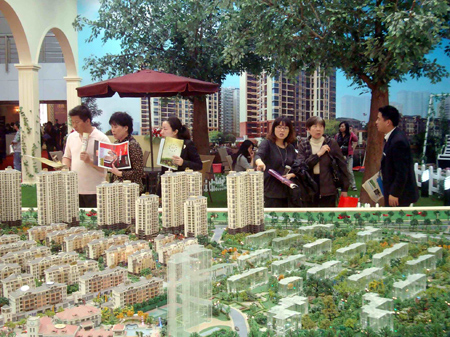Economy
Property price rises will 'boost the retail sector'
Updated: 2011-04-16 09:46
By Gao Changxin (China Daily)
|
 |
|
The opening of Suzhou Spring Housing Fair on Friday in Jiangsu province. In 2010, the land supply for affordable housing in China soared 124.5 percent year-on-year to 24,700 hectares. [Photo / China Daily] |
UBS is warning that consumers will abandon China's housing market
SHANGHAI - The high price of Chinese real estate will boost, rather than dampen, consumer spending and promote growth in the retail sector.
That's according to UBS AG which said potential home buyers will be daunted by the prices and will stop saving for apartments. Instead they will pour their money into the retail sector to raise their overall standard of living, according to Liang Yuchang, executive director at UBS investment research.
In 2010, the price of real estate in Beijing was 27 times the average annual income, five times higher than the global average.
At present, 85 percent of Chinese families can't afford to buy a home, said Liang, citing data from Beijing Municipal Bureau of Statistics and the Chinese Academy of Social Sciences.
"The price is so high that many young people will think it's pointless to save for a home. They will instead spend more on shopping, travel and education for their children," said Liang, whose research focuses on the retail sectors in the Chinese mainland and Hong Kong.
However, he doesn't foresee a real estate market meltdown and said sustained high prices over next 15 years will help fuel annual growth of 15 percent in the retail sector over the same period.
Liang cited a similar scenario in Japan during the nation's property boom in the 1980s.
From 1974 to 1988, the number of Japanese who listed buying homes as one of their three strongest incentives for saving dropped from approximately 33 percent to around 17 percent. Meanwhile, the incentive to save for cars, furniture, travel, and education increased, said Liang, citing a survey by the University of Tokyo.
From 1993 to 2010, the saving rate among the Japanese population fell from around 14 percent to approximately 2 percent, in sync with a drop in the urban land price index from 120 to around 60, according to Liang.
Early in March, Housing and Urban-Rural Development Vice-Minister Qi Ji, told a news conference that the country plans to build 10 million affordable homes this year, as part of a 1.3 trillion yuan ($197 billion) investment to build 36 million properties for low-income families by 2015.
In 2010, the land supply for affordable housing in China soared 124.5 percent year-on-year to 24,700 hectares amid rising demand for affordable housing, the ministry said.
"But that will not prompt Chinese consumers as a whole to start saving to buy homes, because the affordable-homes project will only cover 10 percent of the total population." Liang said.
E-paper

Han me downs
Traditional 3,000-year-old clothes are making a comeback.
Reaching out
Fast growth fuels rise in super rich
Chinese tourists spend more
Specials

Big spenders
More mainland tourists are expected to spend money on overseas travel this year.

Rise in super rich
Report cites rising property prices, gdp as key drivers of increasing number of chinese millionaires.

Reaching out
Condom makers are stepping up their presence in smaller cities to boost sales




